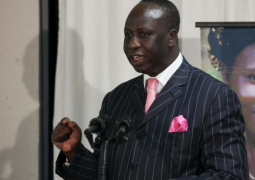Hello and welcome to yet another edition of Health Matter. In our today’s edition, we bring you an interview we had with Dr. Abubacar Abdullah Senghore, Dean of the Faculty of Law at the University of the
Noting that fasting has so many benefits including health, Dr Senghore stated that when one is fasting for the whole day without eating or drinking, it will generate heat on the body, which can in turn eliminate the germs, virus and burns down the amount of fat in the body which can develop sickness.
“The body need balance a diet and when eating you should not rely on one food. Naturally the amount of food you put on your stomach has to be limited. It provides the opportunity to normalize the frequency of eating and help the food taken to digest,” he said.
According to Dr Senghore, fasting also helps one avoid the risk or unhealthy attitude of mixing so many different foods in the stomach in a day.
Fasting, he went on, also helps to control the flow of blood inside the body and gives tranquility and stability of the mind.
“When the level of sugar inside the blood goes down, the person feels hungry but after breaking fast with some dates and hot tea with sugar, this will restore the level of sugar needed in the blood,” he said, adding that after that, one’s system becomes stabilized.
This state of affairs, he added, allows one the opportunity to be able to control his/her hunger and manner of eating and therefore save him/her from overloading stomach.
For Muslims who smoke cigarette or its related substance, fasting will gave them the opportunity to do away with unhealthy practices like a reduction in way the smoke during Ramadan.
Is fasting during Ramadan good for your health?
With the beginning of Ramadan, the Muslim holy month of fasting, the annual debate starts up about the effect of fasting on the health. It is accepted that fasting is not a good idea for sick people. But does it benefit those in good health, or is it merely a religious practice that has nothing to do with one’s well-being?
Muslims are only expected to fast if they are healthy adults. Sick people, whether suffering from temporary or chronic disease, are exempt. Many scholars of Islamic sharia law say fasting is prohibited if it is harmful.
The Prophet Muhammad is quoted as saying: “Fast so as to be healthy”. Some Muslim scholars have been trying to get support from doctors to prove the health benefits of fasting. Each year, much of the Islamic media covers the benefits of fasting during Ramadan, and the hazards for sick people if they try to do without food.




